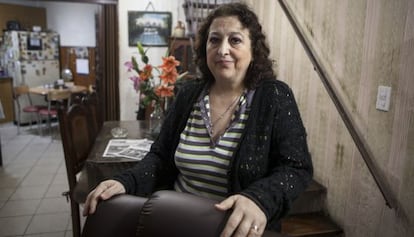Argentina’s other stolen babies
Not all those who were taken from their parents at birth were victims of the military regime


Last August, after a 36-year search, the president of the Grandmothers of the Plaza de Mayo organization, Estela de Carlotto, found her grandson, who was stolen by the military dictatorship in Argentina. The very next day, her NGO received a record number of calls.
At least 300 people got in touch with the human rights group’s headquarters to offer their DNA samples for a data bank, designed to identify those who were stolen during the military regime that ruled Argentina from 1976 to 1983. It was much more than the 15 daily phone calls the Grandmothers of the Plaza de Mayo offices usually received.
Even before the dictatorship, people here have always taken other people’s children”
But since the day that Estela de Carlotto’s grandson was found, only two more cases have had similar happy endings.
In fact, tens of thousands of Argentineans who were never victims of the dictatorship are also searching for their real parents, having been separated from their families at birth, and then either stolen, given away or sold.
“Even before the dictatorship, people here have always taken other people’s children,” says Alejandro Inchaurregui, the director of Buenos Aires province’s Disappeared Persons Registry, one of the few public agencies that helps people find their true identities.
“Above all, it is the rich who take children from the poor,” he explains.
The registry was set up in 1999 to help families who lost loved ones during the military regime. But 10 years ago, after receiving many requests, it expanded its search duties to help all those who had been separated from their families.
Of the 2,600 cases on file, the registry has been able to correctly identify 800.
In some instances, Buenos Aires province investigates legal adoptions so that adults can find their real mother. Through records searches, those cases are solved quickly. But most others need more time because the babies were sold to other families.
Sometimes the biological mother had to give up her child because she couldn’t care for the baby, had been a rape victim, or got pregnant as a teenager – something that wasn’t easily accepted in Argentinean society back then.
Some people received money for selling their babies, but this wasn’t the general rule. Not all parents who took in children from other families handed over money, but Inchaurregui insists that the majority did.
At times, there were middlemen – doctors, midwives or nurses – who helped with the transactions and, of course, received fees for their services. In some cases, they stole the baby after telling the mother that her child had died at birth and that they were unable to give her the body.
Even though laws passed in the 1970s and 1990s made it easier for Argentineans to adopt, people in the provinces in the north, such as Santiago del Estero or Misiones, claim that these baby sales still take place.
But Patricia Peña, president of the NGO Raíz Natal, which also helps identify missing children, say that Argentineans have become aware of the criminal consequences they could face if they register a stolen baby as their own. This awareness was spawned by the stories of the estimated 500 children stolen by the dictatorship.
Sometimes the biological mother had to give up her child because she couldn’t care for the baby, had been a rape victim, or got pregnant as a teenager
In 1999, Peña asked the Grandmothers of the Plaza de Mayo for help to find out her background.
She knew she wasn’t a stolen baby from the dictatorship because she was born in 1958, but Peña always suspected that her mother and father were not her real parents even though they both insisted that they were.
After the couple died, a family member told Peña the truth.
She found out that her real mother was a teenager in Mar del Plata who had a relationship with a doctor in his 30s. Both from middle-class families, they came to Buenos Aires to give up the girl without receiving any money to the parents that eventually raised her.
Peña never tracked down her real parents, but has helped others reconnect with their true families.
Tu suscripción se está usando en otro dispositivo
¿Quieres añadir otro usuario a tu suscripción?
Si continúas leyendo en este dispositivo, no se podrá leer en el otro.
FlechaTu suscripción se está usando en otro dispositivo y solo puedes acceder a EL PAÍS desde un dispositivo a la vez.
Si quieres compartir tu cuenta, cambia tu suscripción a la modalidad Premium, así podrás añadir otro usuario. Cada uno accederá con su propia cuenta de email, lo que os permitirá personalizar vuestra experiencia en EL PAÍS.
¿Tienes una suscripción de empresa? Accede aquí para contratar más cuentas.
En el caso de no saber quién está usando tu cuenta, te recomendamos cambiar tu contraseña aquí.
Si decides continuar compartiendo tu cuenta, este mensaje se mostrará en tu dispositivo y en el de la otra persona que está usando tu cuenta de forma indefinida, afectando a tu experiencia de lectura. Puedes consultar aquí los términos y condiciones de la suscripción digital.








































